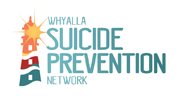SAFE LANGUAGE &
TALKING ABOUT
SUICIDE
SAFE LANGUAGE & TALKING ABOUT SUICIDE
a guide of preferred language to use when communicating about suicide
Certain language may be problematic when discussing suicide.
Our friends at Roses in the Ocean have provided us with a guide of preferred language to use when communicating about suicide. The guide also highlights phrases and language, which may be problematic, especially in perpetuating negative stereotypes.
Don’t say…
Do say…
Why?
Don’t say…
‘committed’ or ‘commit suicide’
Do say…
Why?
To avoid association between suicide and ‘crime’ or ‘sin’ that may alienate some people.
Don’t say…
‘unsuccessful suicide’
Do say…
‘non-fatal’ or ‘made an attempt on his/her/their life’
Why?
To avoid presenting suicide as a desired outcome or glamourising a suicide attempt.
Don’t say…
‘successful suicide’
Do say…
‘took their own life’, ‘died by suicide’ or ‘ended their own life’
Why?
To avoid presenting suicide as a desired outcome.
Don’t say…
‘suicide epidemic’
Do say…
‘concerning rates of suicide’
Why?
To avoid presenting sensationalism and inaccuracy.
Don’t say…
‘mental patient’, ‘nutter’, ‘lunatic’, ‘psycho’, ‘schizo’, deranged’, ‘mad’
Do say…
A person is ‘living with’ or ‘has a diagnosis of’ mental illness.
Why?
Certain language sensationalises mental illness and reinforces stigma.
Don’t say…
‘victim’, ‘suffering from’ or ‘affected with’ a mental illness
Do say…
A person is ‘being treated for’ or ‘someone with a mental illness’
Why?
Terminology that suggests a lack of quality of life for people with mental illness.
Don’t say…
A person is ‘a schizophrenic’, ‘an anorexic’
Do say…
A person ‘has a diagnosis of’ or ‘is being treated for…’
Why?
Labelling a person by their mental illness.
Don’t say…
‘crazed’, ‘deranged’, ‘mad’, ‘psychotic’
Do say…
The person’s behaviour was unusual or erratic.
Why?
Descriptions of behaviour that imply existence of mental illness or are inaccurate.
Don’t say…
‘happy pills’, ‘shrinks’, ‘mental institution’
Do say…
Antidepressants, psychiatrists oy psychologists, mental health hospital.
Why?
Colloquialisms about treatment can undermine people’s willingness to seek help.
Don’t say…
‘psychotic dog’, using ‘schizophrenic’ to denote duality such as ‘schizophrenic economy’.
Do say…
Reword any sentence that uses psychiatric or media terminology incorrectly or out of context.
Why?
Terminology used out of context adds to misunderstanding and trivialises mental illness.
At every opportunity, it is important that we improve the suicide literacy of the community including the use of non-stigmatising and safe language when discussing suicide.
talking about suicide
Content sourced from Everymind
Suicide is an important issue of community concern and needs to be discussed.
When someone is going through a difficult time lets consider ways to help them feel connected and heard rather than judged and alone. You don’t have to be qualified to listen, you may be having a bigger impact than you know.
Suicide Prevention is everyone’s business; preventing suicide is important across all communities.

Further guidelines regarding terminology and discussion of mental health in the media can be accessed through the MindFrame website:
https://mindframe.org.au/suicide/communicating-about-suicide

For a more in-depth guide to discussing suicide visit Conversations Matter, a practical online resource to support and effective community discussions about suicide at:

www.everymind.org.au/suicide-prevention/understanding-suicide/role-of-language-and-stigma


